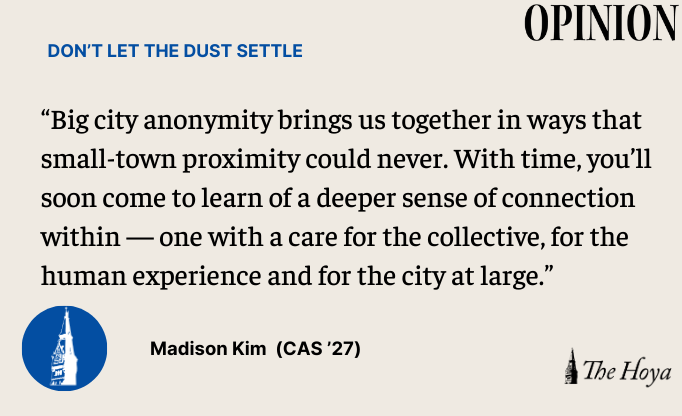The realization that I was largely inconspicuous came, as most epiphanies do, quite simply.
It was a Tuesday afternoon, nearing the end of my first semester as a high school freshman, and I was sitting on a park bench located in a shady cluster of trees at the corner-end of Rockefeller Park in New York City — close enough to feel the moisture of the air but too far to face the wrath of the late-autumn sea breeze.
It was at that moment, while watching the passersby tear down the street, that I first became aware of a certain sense of community only found in urban places like Manhattan — one fostered by a collective sense of apathy.
Everyone, whether it be men in slim-fitted suits or women in neon-colored exercise gear, seemed to move with polished, assertive strides, all operating under the assumption that nobody on the street cared for them, while simultaneously reciprocating that sentiment in full. And I, now a part of the city myself, was expected to comply with this notion.
My relative invisibility wasn’t a revelation worth acknowledging; rather, it felt like something I’ve known since my arrival. I suppose a better word for it, then, would be a confirmation.
At the time of this confirmation, it was my third month in the city. I had initially approached its streets with the kind of naive ferocity you only see in overzealous freshmen, with the firm and callous belief that I was meant for bigger and better things than the sleepy suburbs — something I soon came to regret. I quickly found myself drained, lonely and terribly depressed.
There is nothing more self-assured than the nature of big cities, whose forward momentum stops for no one but itself. Thus, approaching a city with hubris is futile, for its own overimposing sense of arrogance will just spit you back out. I learned this lesson far too late, though, and soon found myself caught in its teeth, stuck in a rut with seemingly nowhere to go.
In retrospect, I guess my expectations of a bigger life in the city were pretty typical, especially considering that I was freshly 14 and had lived my entire life on the peripheries of the “real world”; my hometown is in the suburbs of Queens, merely a train ride away from Manhattan.
I wasn’t aware of the flaws in my approach, though, and, as a result, ended up with my expectations crushed. Being in New York City, among millions of victors and visionaries and innovators, I was supposed to be the same. I was supposed to be someone.
Given this, you can imagine my surprise when I eventually found myself embracing the city for the very aspects I had previously despised.
Though I’ve only referred to New York City up until this point, all cities tend to have a few commonalities that seem to capture their essence in totality.
Take, for instance, these shared traits: in a city, it is rare to run into a stranger twice. Friendly street vendors will always remember your order after a month. On the streets, there’ll usually be some kind of rodent — better dead, but usually alive. There’s always a Brandy Melville somewhere. And, most importantly, it is impossible for its residents to be singularly defined.
This last point is the most important.
There is no uniform definition for a “New Yorker,” and I’m sure it’s the same for the dwellers of D.C., even for the Georgetown community. Yet, all residents act as equal contributors to the collective city experience. In short, it is our differences that make up the city for what it is: big and bright and full of memories.
It’s quite easy to feel invisible in such settings, and Georgetown, located in the urban sprawl of Washington, D.C., is no exception. From my experience, I have found that the best way to combat such feelings of inadequacy is to embrace this anonymity; to look around, listen to others and learn from those who’ve done it before and those who haven’t alike.
Embracing anonymity has little to do with simply accepting your unimportance; it instead has to do with finding value in being part of a greater community.
Constantly seeking special recognition and validation hinders our appreciation for the nature of the community we find ourselves in. Adopting others’ experiences — whether it be through listening to others voices, observing the city’s rhythm or just being one amongst a multitude of different individuals — will bring us much more fulfillment.
While I initially viewed this mindset as a major flaw, I’ve become a lot happier since coming to terms with the fact that I’m not the center of the universe. By accepting anonymity, we are given the chance to reflect on others besides ourselves, and by having learned from others, I’ve found that focusing less on myself has brought me closer to being a “someone” than anything else I’ve ever tried.
Big city anonymity brings us together in ways that small-town proximity never could. With time, you’ll soon come to learn of a deeper sense of connection within — one with a care for the collective, for the human experience and for the city at large.
Finding humility in being one of many is the first step in the pursuit of happiness.
Madison Kim is a first-year in the College of Arts and Sciences. This is the second installment of her column, Don’t Let the Dust Settle.














